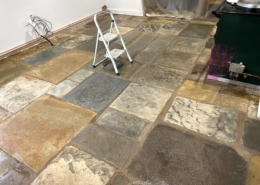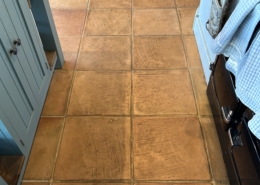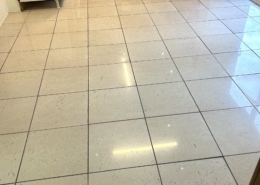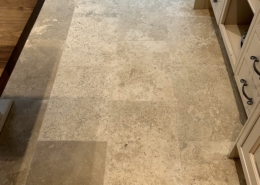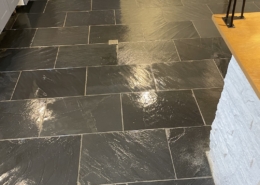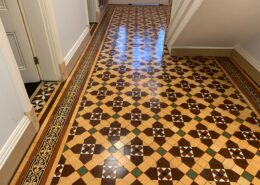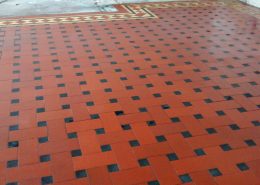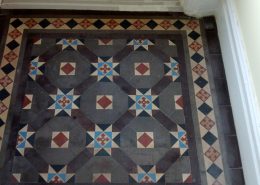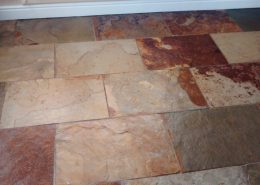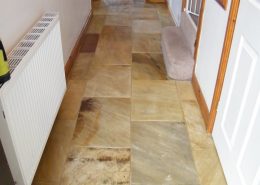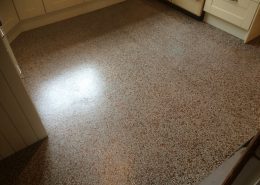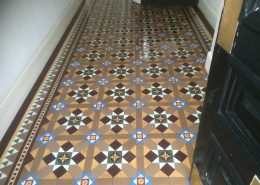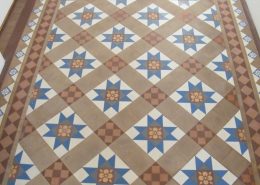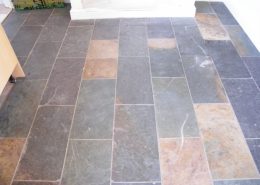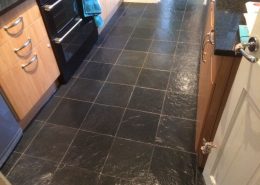Travertine floor cleaning Manchester
Travertine is form of limestone. It’s soft but makes for excellent floor tiles. Providing it’s look after correctly it will last a long time. That said, it can easily become damaged if care isn’t taken to maintain it. If you’d like help cleaning or restoring your travertine tiling why not call Tile & Stone Medic and ask for our travertine floor cleaning and restoration service today?
Common issues
Travertine flooring can suffer from a range of common problems, but most are quite simple for an experienced professional to deal with.
Etching is common issue we see with our travertine floor cleaning and restoration service in Manchester. Since travertine is porous it is easily marked by spillages of common household items like wine, vinegar, tomato sauce and similar liquids. Etching looks like pale marks on the surface of the tile, which are usually left behind after such a spillage. It can be both a small patch of discolouration, or can cover several tiles depending on the scale of the spill.
Travertine is often polished and should always be sealed too. It can be honed to a matt finish or taken to more of a high sheen. Unfortunately general wear and tear is unavoidable, heavy footfall, moisture and day to day use will wear down the sealed and polished surface of the tile over time. If you’ve noticed your travertine tiles becoming generally dull they may need a fresh polish to bring them back to life.
Re-applying sealer is a common part of our travertine floor cleaning and restoration service in Manchester, and it’s an essential part of keeping these types of tiles in good shape. Sealant works like a barrier against day to day wear and tear, but while doing its job protecting the tiles it will gradually wear down. Aging sealant not only leaves the travertine tiles looking dull, but also leaves them more susceptible to staining, so you should always ensure the seal is topped up.
If the subfloor underneath your travertine tiles is allowed to shift, for example if it was laid a long time ago, it can lose it’s hold on the tiles. Any movement in the subfloor will eventually become noticeable from the tiles. If unchecked the tiles may become seriously damaged, running the risk of chips or cracks. As grout between the tiles ages, the risk of loose tiles also increases. Also, if light coloured grouting has been used it will show dirt more easily, this dirt is often then trodden into the tiles, leaving unsightly marks.
How we maintain travertine tile flooring
We employ a range of techniques to restore damaged or aged travertine flooring. If a floor has etching, our travertine floor cleaning and restoration service in Manchester will begin with an assessment of the scale of the damage. Our technique typically involves using a specialist polish solution to lightly buff out visible damage, before applying a final polish and a sealer.
For dull-looking travertine tile floors, a simple clean and finishing polish might be all that is required to bring life back to the tiles. Polishing can be tailored to your wishes depending on the finish you’d like to achieve. Tiles can be left matt or buffed to a high level of shine. We’d strongly recommend finishing with a professional sealer to prevent future staining from spillages and general daily abrasion. A top up approximately once a year helps maintain this protection.
When working with badly damaged tiles which have smashed or cracked we we would need to make a complete assessment of the damage to the travertine stone before we settle on a solution. It may be the case that a tile needs to be fully replaced, in which case our travertine floor cleaning and restoration service in Manchester can offer help sourcing replacement stone.
Will repairing my travertine tiles cause disruption
When conducting our travertine floor cleaning and restoration service in Manchester, we always try to make our repairs convenient for you and cause an absolute minimum of disruption to you and your home. Repair of travertine tiling which has suffered light staining or dulling can often be finished within a few hours. Repairs don’t usually involve bulky or heavy pieces of machinery and the strongest chemicals used would be mild alkali, work is always carried out in the safest way possible. You can rest assured our work will be completed as efficiently as possible, so you can get back to enjoying your home.
If your travertine floor tiling need some professional care and attention then don’t hesitate to get in touch with Tile & Stone Medic today and ask about our travertine floor cleaning and restoration service in Manchester!
FAQs
The process we carry out will depend on your specific floor and the use that it gets. There will be variations for different materials and the finish that you wish to achieve. The process will also be impacted by the full scale of work that we carry out, for example which types of cleaning and restoration are being performed. It is not unusual to apply several layers of sealant if this is necessary and appropriate.
Firstly, a floor should always be sealed when it is first laid. Get in touch with us straight away if this hasn’t been carried out already. It will also need periodic sealing in order to protect the floor on an ongoing basis. How often sealing is required depends on a number of factors such as the specific material used for your flooring and the kind of use it has to survive. For example, a bathroom with natural tiles that is frequently exposed to water may require sealing more often than porcelain tiles in a kitchen. Frequent maintenance, such as sweeping and hoovering up the dust and grit that erodes floors when trodden on can help. Once the sealant is worn away, not only will scratches be more likely, the risk of staining or permanent damage from liquids is drastically increased as there is no protective layer to prevent absorption. If in doubt get in touch with our team of friendly technicians who can discuss your needs.
We have a range of high quality Faber products which will help protect your floors from damage. As every type of floor is different and has myriad uses, we will consult with you to work out the best way to protect your investment. We can apply topical sealants which form a protective layer on top of the floor, or if needed an impregnating sealant, which will be partially absorbed into the stone or tiles. There are many variations of these sealants and as each floor type has unique characteristics and vulnerabilities we can work with you to find and apply the the best kind of protection.
Absolutely. If this was not carried out by those who fitted the floor get in touch immediately to ensure that the appropriate protection can be applied as promptly as possible. We would recommend that this is carried out once the flooring is in place as this means the grout, which is generally more porous, will also be protected.
We apply a sealer to a floor in order to protect it. Different types of floor, both manmade and natural stone, are vulnerable to different sorts of damage. They can all be harmed by chemicals to a certain degree, even by the acid in food and drink spillages, as they will be very slightly porous. As well as this, they can be worn away by physical damage. Even foot traffic can have a big impact if dust or grit has built up on the floor, since it increases abrasions. A sealant will reduce the chance of a spill becoming a stain by reducing the floor’s ability to absorb liquids. It can also help protect the appearance of the floor by forming a protective barrier. A sealant won’t prevent all damage and it will still wear away over time, but it will help your floors last longer, helping protect your investment. Sealants will even help protect your floor from UV radiation which can lead to fading over the lifespan of a high value stone or tiled floor. We can consult with you to find the best sealant for your floor and the type of use it gets to make sure it receives the best form of protection.
We are happy offer advice on best practice to look after your flooring, but it depends on the type of floor you have. Once we’ve had a look at it we’ll be able to help.
Yes, we have a range of fillers we can use to repair chipped or dented stone. Please note we can only carry out floor repairs as part of a full deep clean or restoration for your stone floor. Unfortunately, we are not able to attend to carry out repairs in isolation.
Usually we are able to stabilise stone flooring where it has become loose. We can repair grouting and make spot repairs to the subfloor where necessary. However please note, we do not offer a re-grouting service and we can only carry out floor repairs as part of a full deep clean or restoration for your stone floor. Unfortunately, we are not able to attend to carry out repairs in isolation.
Almost certainly. Send us a picture or a description and we’ll identify your stone. We always assess a surface before work starts in order to pick the most appropriate solution.
Whilst we may use specialist chemicals in the course of our work, we can assure you that by the time we leave all residues will be gone and your tile or stone flooring will be perfectly safe for everyone to use. We work to extremely high standards of health and safety, conducting proper risk assessments where appropriate and never putting you or anyone else in danger.
We always work in the most considerate way possible. Work will be tailored to your needs and will fit around your schedule where possible. We avoid bringing loud or bulky machinery into your home and when a job is complete we thoroughly clean up after ourselves to leave your space looking as tidy as it did when we arrived.



